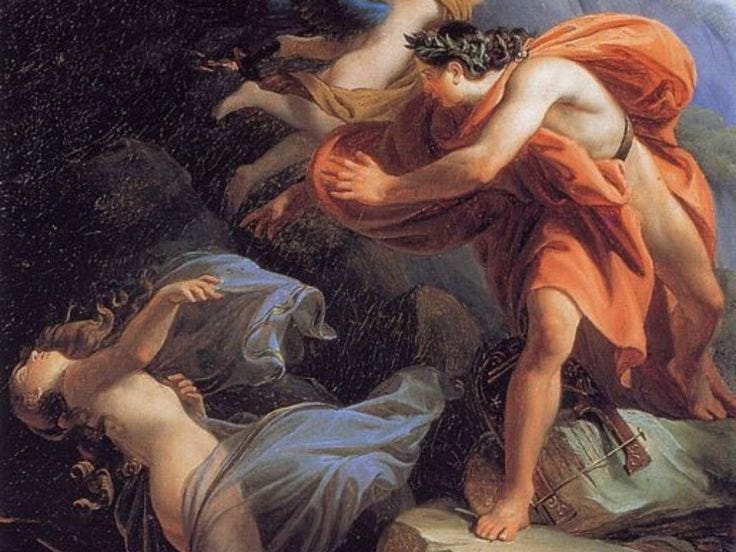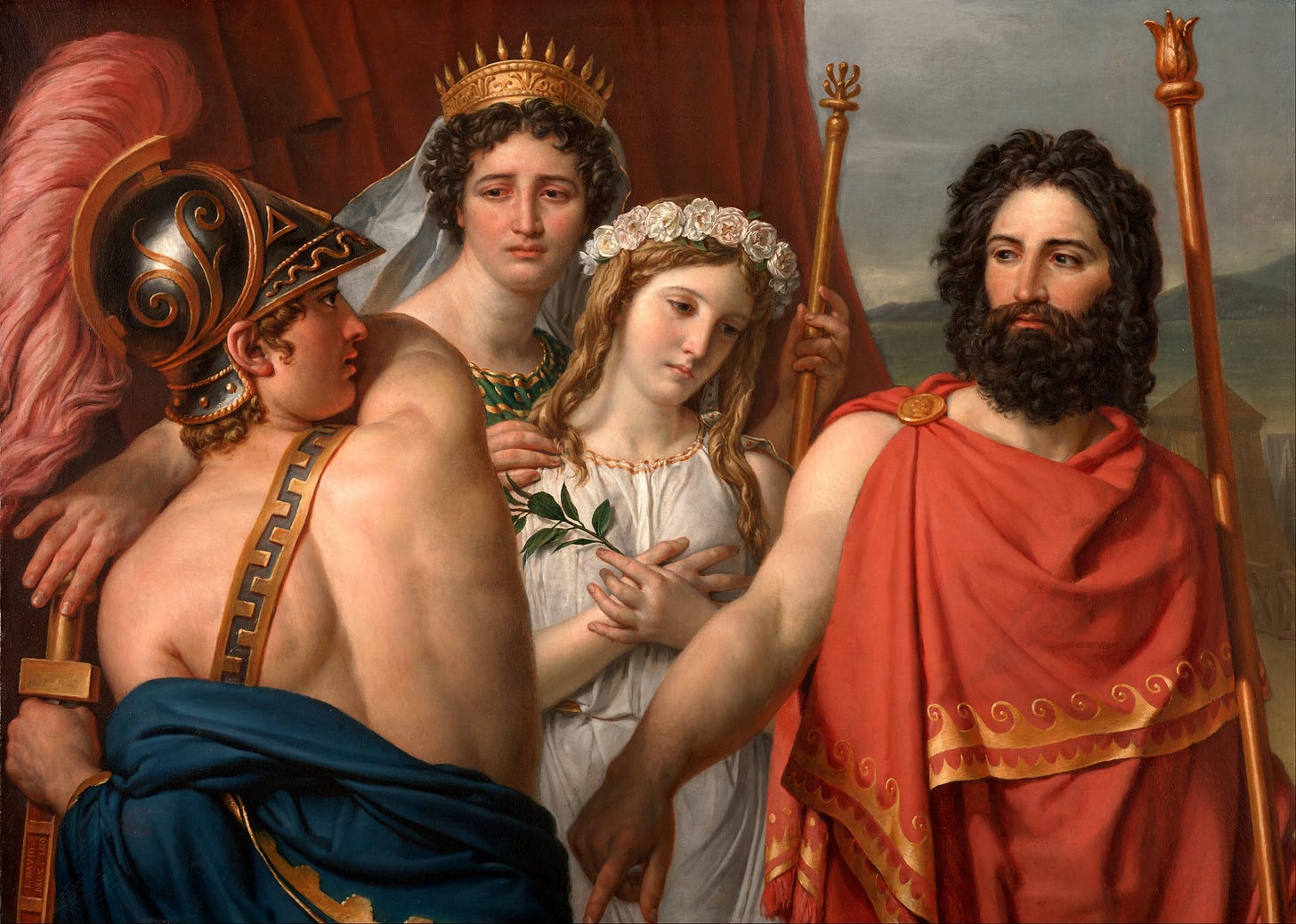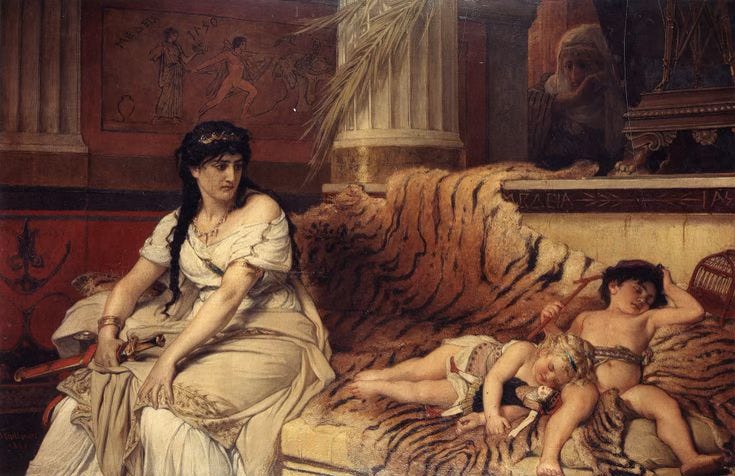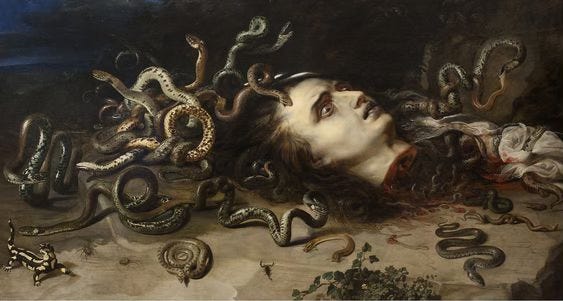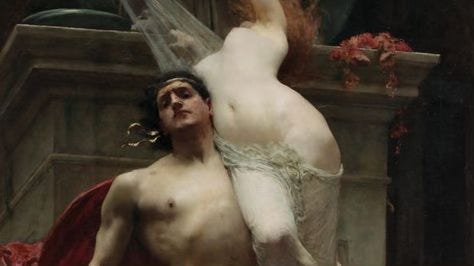According to Aristotle, tragedy in literature is quite a fascinating genre to us, the viewer, despite the gore and macabre it is accompanied with, and the disgust it induces. But it’s this disgust, and pity, and fear where its allure rests and why we are drawn to it. These emotions are reflected back to us in such a magnified way, that we experience catharsis during the play and purge ourselves from these emotions without actually, physically experiencing them.
The first time I read this theory I found it really interesting and it got me questioning myself why I like the tragic tales that have made such an impression on me that I have now titled them my favourites. But it wasn’t until I was reading a couple retellings of The Orestia that I realised, every time I would read Iphigenia being murdered, I would cry along with Clytemnestra.
It wasn’t a proper experiment, not an intentional one, but it proved Aristotle’s theory.
So for some cathartic/masochistic (semantics really) reasons, I wanted to compile a list of my favourite tragic tales to make myself sob every time I’d open this post and remind myself of the pain and frustration, because all of these characters deserved better.
This will be the greek mythology version since those are the most unhinged tales.
You will notice that my favourite stories are definitely the ones about star-crossed lovers, especially when there’s some cruel twist of fate that is either keeping them apart or killing one and leaving the other to grieve until their own demise. Even better if they’re the mortalximmortal trope.
TW: mentions of violence, sa and death.
⊹ ࣪ ˖ Iphigenia in Aulis
Let’s start with the tale that was the basis of this post. For those who don’t know, Iphigenia in Aulis is a tragic play by Euripides. It tells the story of Iphigenia’s death, as she was sacrificed by her father Agamemnon in front of the entire army and her mother Clytemnestra, so that the goddess Artemis would grand the Greeks wind to sail to Troy for the famous Homeric war.
It is the story of a young girl, being told she would marry the greatest of the Greek warriors and painted a whole new life of glory and prosperity, only to learn that she won’t be going to her altar as a bride, but as a human scapegoat.
Iphigenia’s death hits hard because everyone she loves is being forced to watch and her own father doesn’t think twice before sacrificing her for a war. And despite that, she chooses to face her death willingly, not wanting to be dragged to the altar like cattle.
⊹ ࣪ ˖ Artemis and Orion
As I said, I love the mortalximmortal trope, so Artemis and Orion have to be here. Artemis is the goddess of the hunt and her closest companions have always been her twin, Apollo, and her nymphs. Until Orion came along. He was a human hunter, extremely talented and strong for a mortal and that quickly made him Artemis’ favourite. As they hunted together, they became lovers. The fact that his sister could love a mere mortal made Apollo’s jealousy spike up and decide to kill Orion. (Like he’s one to talk. What about Hyacinthus, Apollo? Wasn’t he a mere mortal too?)
Now, Apollo could have chosen any other way to do it, but instead he decided to trick Artemis into thinking Orion was a monster attacking the city and she shot him with one of her arrows. Only when she saw the smile on Apollo’s face did she realise what her brother had done.
She took Orion’s dead body on her silver moon chariot and turned him immortal, scattering him into a constellation in the sky where he would live forever.
⊹ ࣪ ˖ Medea
Medea is another tragic play character. She is the mythical granddaughter of Helion—the god of sun—and niece of Circe—the enchantress who turned Odysseus’s men into swine. She possessed her own magic powers, and is most famously known for using them to aid Jason into getting the golden fleece.
In Euripides’ play, Medea is set on revenge against Jason who, after marrying her, abandoned her and their two sons for another woman. In her warpath of retribution, Medea is almost blinded by rage and bloodlust for anyone she can use to cause Jason the biggest pain she can—in the end of the play, that includes her two sons as well.
There are multiple discussions and studies done on her character; whether it is right to hate her or whether her actions can be justified. But we all know it’s all Jason’s fault.
⊹ ࣪ ˖ Medusa
Yes, Medusa is definitely in here because Ovid’s version of her tale just breaks my heart. Usually Medusa is painted or sculpted as a monster, but even the 5th century pottery has portrayed her as beautiful, so I love Ovid’s version even more.
Here, Medusa was said to have been a beautiful maiden who was pursued by Poseidon despite her many objections. Because of this, and his rivalry with Athena, he decided to humiliate the other goddess by raping Medusa in Athena’s temple. Enraged, Athena decided to punish Medusa (funny how she did nothing to Poseidon) by turning her hair into vicious snakes. Medusa was immediately seen as a monster, though she was a victim at the same time. Later on, she was decapitated by Perseus so he could present her head as a prize to Polydectes.
(This is just proof that Athena was not a girlies’ girl. And that Medusa deserved better.)
⊹ ࣪ ˖ Apollo, Hyacinthus and Zephyrus
Another mortalximmortal tale that I absolutely adore because it’s pure pain. In this one, Apollo—the god of sun (and more), and Zephyrus—the god of the west wind, are rivals, fighting for the love of Hyacinthus—a handsome, Spartan youth. Apollo manages to win Hyacinthus’ affections first, making Zephyrus extremely jealous. So one day, while Apollo and Hyacinthus were playing with a discus, Zephyrus sent forth a gust of wind that deflected the discus and hit Hyacinthus in the head.
The wound was too great and so the boy died. Grief stricken, Apollo turned him into a flower, making him immortal. The whole of Sparta turned his death into an early summer festival—the Hyacinthia—to represent the passing of the spring (the youth) and the arrival of the summer heat.
⊹ ࣪ ˖ Cassandra
Cassandra’s tale is probably the saddest, because not only are all these stuff happening to her, but she isn’t even afforded the mercy of death or some sort of power to protect herself.
Cassandra was one of Priam’s daughter and a princess of Troy. She was also a priestess of Apollo and admired by him. One day, as she was worshipping at his temple, Apollo showed up and granted her the ability to predict the future in order to win her love. Cassandra rejected him, knowing she would have to leave the temple if she became his lover.
Because Apollo couldn’t revoke his gift, he changed it into a curse: Cassandra would still predict the future, but no one would believe her.
After the burning of Troy, when the Greeks were destroying the city and collecting their prizes, Cassandra fled to the temple of Athena, hoping the Greeks would spare her for the sake of their favourite goddess. Ajax, one of the warriors, did not. He dragged Cassandra from the temple and raped her. (He did get his punishment though, when Athena sent forth a couple of storms when the Greeks were sailing back from Troy)
But then Cassandra was given to Agamemnon as his war prize, and once they returned to Mycenae, she was killed by Agamemnon’s wife, Clytemnestra.
⊹ ࣪ ˖ Achilles and Patroclus
Do I need to explain myself with this one?
“…till I place Patroclus on his pyre and heap his mound
and cut my hair for him—for a second grief this harsh
will never touch my heart while I am still among the living.”
All you guys need to know is that they were really good friends.
I don’t want to make this post too long, so I will end part 1 here. These are just some of the more popular tragic greek tales that I think of on the daily. I am very curious to know which ones you guys like, so let me know in the comments 👀 especially if it’s one that I haven’t mentioned here~
Until next time…





